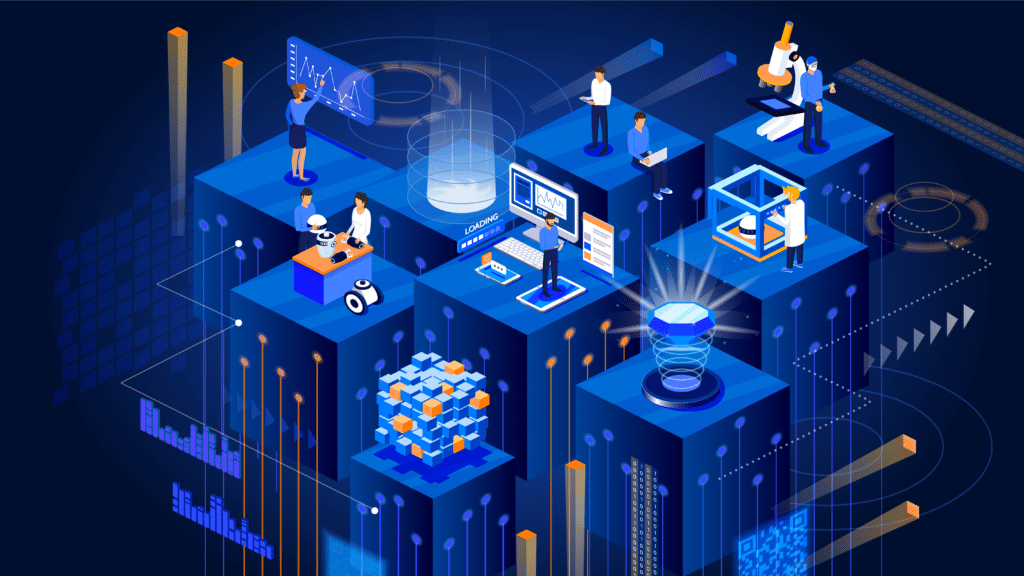The healthcare industry is on the verge of a new era of artificial intelligence (AI)-driven transformation. Over the past few years, AI has been effectively applied to individual tasks such as medical reconciliation, ambient listening, and analyzing medical images and lab results. However, its potential to drive system-wide transformative change has remained elusive due to persistent challenges such as data silos, high model training costs, and inflexibility of trained models. The emergence of agentic AI with independent, autonomous, and self-learning AI agents represents a paradigm shift. This new paradigm enables AI to evolve from performing individual isolated tasks to acting as a transformative multiplier across healthcare organizations. As agentic AI matures, it will substantially improve patient and provider experiences, business outcomes, and clinical operations.
The shift from traditional AI to agentic AI
Traditional AI systems in healthcare have operated within carefully defined parameters, excelling at specific tasks such as assisting patients with reminders and wayfinding based on their appointments, detecting abnormalities in medical imaging, or predicting infection risks. However, these systems have always required explicit direction and human oversight for each discrete task they were trained to perform—functioning like specialized medical technicians, highly skilled in their specific domains but not intended to operate beyond their predetermined boundaries.
Agentic AI marks a significant departure from these limitations. Unlike traditional AI, which follows predefined rules and requires direct human intervention, agentic AI can autonomously interpret data, make independent decisions, and adapt to evolving clinical scenarios. These capabilities position it as an emerging essential partner in healthcare.
Advancing clinical decision-making
Consider the evolution of AI in supporting clinical decision-making. Traditional AI systems might flag potential drug interactions or alert clinicians to abnormal lab findings. In contrast, AI agents function more like experienced clinical coordinators capable of learning and adapting. They maintain a comprehensive view of a patient’s care journey, proactively identify potential complications, coordinate care across multiple specialists, and suggest evidence-based interventions based on real-time patient data and the latest medical research.
For example, an agentic AI system integrated with an Electronic Health Record (EHR) could continuously monitor patient data streams, identifying early warning signs of sepsis before human clinicians recognize them. By analyzing trends in vital signs, laboratory results, and historical data, the agent could recommend preemptive interventions or even coordinate with other agents to significantly reduce mortality rates. Unlike traditional AI alerts, which can contribute to alarm fatigue among clinicians, agentic AI prioritizes and refines its recommendations over time based on user feedback and evolving clinical guidelines.
Revolutionizing patient engagement
The transition from basic chatbots to sophisticated AI agents further illustrates the shift from traditional AI to agentic AI. While conventional patient engagement tools might send automated appointment reminders or provide static health information, emerging AI agents can maintain ongoing patient relationships. These agents adapt their communication styles, understand health history, monitor adherence to treatment plans, and proactively schedule follow-ups based on patient availability.
For example, a patient recovering from surgery could receive personalized rehabilitation guidance from an AI agent that adjusts recommendations based on progress, pain levels, and reported mobility. The agent could escalate cases requiring medical attention by integrating with remote patient monitoring systems and notifying providers of potential complications.
Empowering the healthcare workforce
Agentic AI’s potential extends beyond clinical decision-making to reshaping workforce dynamics. As AI agents take on complex administrative and clinical tasks, healthcare professionals will shift their focus to high-value patient interactions. Nurses, for instance, might spend less time on documentation and more time on direct patient care. Physicians can leverage AI agents to synthesize vast amounts of medical literature and patient data, allowing for more informed decision-making.
However, to maximize AI’s potential, healthcare organizations must invest in Human-Agent Interaction (HAI) training. This will facilitate seamless collaboration between human users (e.g., clinicians, administrative staff, etc.) and AI agents, fostering trust and effective utilization of AI-driven augmentations and recommendations.
Navigating ethical and regulatory complexities
Introducing AI agents capable of independent decision-making introduces new challenges in ethical oversight and regulatory compliance. Beyond traditional concerns about data privacy, security, and algorithmic bias, healthcare organizations must establish robust governance frameworks to ensure AI operates within appropriate clinical and ethical boundaries. Agentic AI-based systems should implement well-defined action limits (constraints placed on an AI agent regarding the number or type of actions it can take before requiring human intervention) and fallback mechanism to minimize impact of undesired behaviors.
Key regulatory considerations include:
- Transparency and explainability: AI-driven clinical recommendations should be auditable, ensuring that providers can understand and validate the decision-making process.
- Compliance with healthcare regulations: AI systems must adhere to HIPAA, GDPR, and PHI protection standards to prevent the unauthorized sharing of sensitive patient data.
- Clinical accountability: AI agents should augment, not replace, human clinical judgment. Clear protocols must define when AI decisions require human intervention.
For example, an AI agent coordinating care across a health system must be constrained to share patient data only with authorized care teams. Without proper safeguards and action limits, an AI system might inadvertently violate HIPAA by granting unauthorized access to sensitive information. Implementing data access controls, rigorous validation procedures, and AI audit trails serve to mitigate these risks.
The future of agentic AI in healthcare
The healthcare organizations that will thrive in this new AI agent-driven era are those that can effectively integrate agentic AI into patient care, workforce optimization, and operational efficiencies. By fostering an environment where AI agents and healthcare professionals collaborate seamlessly, these organizations will deliver higher-quality, more efficient healthcare services.
Agentic AI’s ability to make autonomous decisions and continuously learn from interactions unlocks new possibilities for medicine. This evolution—from task-based traditional AI to dynamic, adaptive AI agents—represents one of the most significant opportunities for healthcare transformation in recent years.
However, success will depend on thoughtful implementation, governance frameworks, and continuous oversight. The future of AI in healthcare is not just about building smarter machines—it’s about creating responsive, adaptive healthcare systems that leverage the full potential of human-AI collaboration to improve patient outcomes and revolutionize healthcare delivery.

















